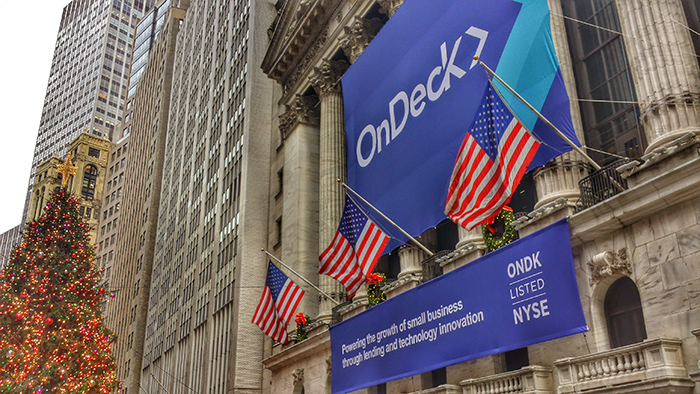Stocks
Industry Stock Performance Update
January 21, 2018 Square is the big winner thus far according to the deBanked Online Lender Tracker. The company’s stock price is up 373% since its IPO and already up 22.76% YTD.
Square is the big winner thus far according to the deBanked Online Lender Tracker. The company’s stock price is up 373% since its IPO and already up 22.76% YTD.
OnDeck and Lending Club by contrast are down by more than 70% from their IPOs and down 17.6% and 2.66% YTD respectively.
But the real loser so far in 2018 is Bitcoin. As of this writing, the Coinbase price of BTC is around $11,310, down more than 18% from its 2017 year-end price of $13,860. Bitcoin had previously reached an all-time high of nearly $20,000.
Meanwhile, the S&P 500 is already up 5.11% YTD. That’s about 59x more than what a Marcus Savings account returned over the same period. Marcus is Goldman Sachs’ online lending and retail online banking arm.
What Will it Take to Grow OnDeck’s Stock Price?
September 20, 2017OnDeck closed at the exact same price on September 14th as it did on July 20th, $4.58. In between, OnDeck reported one of their best quarters ever (they released their 2nd quarter earnings on August 7th) and experienced a temporary boost to $5. Even then, the stock was 75% down from the IPO price and more than 80% down from their all-time high, yet that too couldn’t be sustained.
In Q2, OnDeck only had a GAAP net loss of $1.5 million and announced that they had expanded their collaboration with JPMorgan Chase for up to four years to provide the underlying technology supporting Chase’s online lending solution to its small business customers.
In the rest of the lending world, optimism is in style. Square is up 121% year-to-date, according to the deBanked Online Lender Tracker and even Lending Club is up 14%.
More traditional finance companies like American Express and Intuit are meanwhile hovering near their 52-week highs, according to the Specialty Business Lending Tracker.
Some of OnDeck’s former employees at least appear to be doing well. Just recently, the former Chief Sales Officer was named COO of CoverWallet, the former Director of External Sales was named Chief Revenue Officer of Pearl Capital and the former Director of Portfolio Management and Credit Operations was named SVP at Breakout Capital.
Why OnDeck is Underperforming its Peers
May 29, 2017![]() Small business lending company OnDeck was down nearly 23% on the year when the market closed on Friday. One of their closest rivals, Square, a company that makes business loans in addition to offering payment processing services, was up almost 64% this year so far. The disparity can be partially attributed to the market’s changing perception of OnDeck, originally viewed as a disruptive technology company, to what they’re seen as now, a niche commercial lender. Their tech multiple is gone, putting their market capitalization near book value.
Small business lending company OnDeck was down nearly 23% on the year when the market closed on Friday. One of their closest rivals, Square, a company that makes business loans in addition to offering payment processing services, was up almost 64% this year so far. The disparity can be partially attributed to the market’s changing perception of OnDeck, originally viewed as a disruptive technology company, to what they’re seen as now, a niche commercial lender. Their tech multiple is gone, putting their market capitalization near book value.
Square is faring differently since they have virtually no borrower acquisition costs (whereas OnDeck has high acquisition costs) and a strong revenue stream outside of loans. Square’s strategy is to turn its existing payment processing customers into borrowers.
Meanwhile, Lending Club, an online lender that makes both consumer loans and business loans, is up 6.48% on the year. Despite being down 63% from their IPO price, Lending Club is different in that they generate fee income off of originated loans rather than book loans on balance sheet like OnDeck.
What ties them all together is that OnDeck, Square and Lending Club all rely on chartered banks to make the loans they advertise, a model that is coming under scrutiny by states such as New York. OnDeck and Square both depend on Celtic Bank, a Utah-chartered industrial bank.
Among its peers, OnDeck arguably has the riskiest makeup. They’re concentrated in only one type of lending, they have high acquisition costs, and they retain direct exposure to the loans they generate. Combine that with a lack of profits, lack of growth, and future regulatory challenges ahead, and it’s easy to understand why they’re so significantly underperforming the pack.
OnDeck Shares Drop Again
May 10, 2017The market continued to express their unhappiness with OnDeck on Tuesday by driving the stock down another 6% to $4.06. The stock had already fallen by 7% the previous day after OnDeck posted their quarterly report. Tuesday’s rout may have been caused by a profile published in the Wall Street Journal Monday evening that asserted that OnDeck was really a niche financial company rather than a revolutionary technology platform.
“At 1.2 times book value, it is now valued like a financial company and roughly in line with the average bank. This still looks a bit rich because it has no profits,” wrote WSJ’s Aaron Back.
The deBanked Tracker currently pegs OnDeck’s all-time performance as the worst of their peer group, down 80% since they went public in 2014.
Rough Year? Market Tells Different Story for Alternative Lenders So Far
April 25, 2017 A decent day for OnDeck’s stock on Tuesday was enough to place the company’s share price in positive territory year-to-date, where just about every other public online lender finds themselves as well. According to the new deBanked Tracker, Square is up more than 33% on the year and Yirendai up 19%. Even Lending Club, whose stock is still miles below their IPO price is still up more than 12% in 2017.
A decent day for OnDeck’s stock on Tuesday was enough to place the company’s share price in positive territory year-to-date, where just about every other public online lender finds themselves as well. According to the new deBanked Tracker, Square is up more than 33% on the year and Yirendai up 19%. Even Lending Club, whose stock is still miles below their IPO price is still up more than 12% in 2017.
Meanwhile, Elevate just only went public earlier this month, singlehandedly putting an end to the drought of fintech IPOs. They’re already up 33% from their $6.50 IPO price.
On the publicly traded fund side, Ranger Direct Lending’s YTD struggles stem mainly from their exposure to Argon Credit who is going through bankruptcy. Ranger invested in the Princeton Alternative Income fund who had invested in Argon.
While the deBanked Tracker shows Canadian-listed IOU Financial as significantly underperforming their lending peers, very little volume of the stock trades on a daily basis. A major shareholder of the company however, FinTech Ventures LLLP, shed more than half their holdings of the company last week. As that amounted to nearly 10% of all of IOU’s outstanding shares, the company had to file a document announcing the move.
As an aside, the S&P 500 was up 6.69% YTD by market close on Tuesday and Bitcoin, which doesn’t get as much attention anymore, is up nearly 22% over the same time period.
—
The deBanked Tracker is still in beta and for now is automatically updated once per day after markets close in the US.
FinTech Ventures Fund, LLLP Sheds More Than Half of its Shares in IOU Financial
April 22, 2017FinTech Ventures Fund, LLLP (“FinTech”), a major shareholder of IOU Financial, shed more than half of its holdings in the Canadian-listed company last week. The 7 million shares sold represented nearly 10% of IOU’s outstanding common shares.
According to a statement:
FinTech will review and monitor its options and alternatives with respect to additional acquisitions of Common Shares in light of all relevant factors from time to time, including general market conditions, prevailing market prices for the Common Shares, the business and prospects of IOU and alternative investment opportunities available to FinTech.
Marathon Partners Targets OnDeck Capital
April 17, 2017 Marathon Partners, which owns 1.25 million shares of OnDeck Capital, has drawn a line in sand on the shore of the online lender. The private investor is urging OnDeck, whose share price has shed approximately three-quarters of its value since its IPO, to lower its risk profile amid lofty overhead expenses, which Marathon believes are preventing the online lender from achieving real profitability. Marathon has given OnDeck until the company’s annual shareholder meeting in May to respond. Otherwise the investor has vowed to withhold its support for a trio of board members who are up for a vote.
Marathon Partners, which owns 1.25 million shares of OnDeck Capital, has drawn a line in sand on the shore of the online lender. The private investor is urging OnDeck, whose share price has shed approximately three-quarters of its value since its IPO, to lower its risk profile amid lofty overhead expenses, which Marathon believes are preventing the online lender from achieving real profitability. Marathon has given OnDeck until the company’s annual shareholder meeting in May to respond. Otherwise the investor has vowed to withhold its support for a trio of board members who are up for a vote.
“We’re talking about a stock that is down 75 percent to 80 percent from its IPO price. You’re not going to find a lot of happy campers in that situation. Shareholders are going to ask tough questions,” Mario Cibelli, Marathon Partners managing member, told deBanked.
OnDeck Capital, meanwhile, believes it is on the right path for creating greater shareholder value.
“OnDeck welcomes open communications with all stockholders and values constructive input. Members of our board and management team have met with Marathon on several occasions. We are committed to driving value for all OnDeck stockholders and will continue to take actions to achieve this important objective,” said OnDeck’s Jim Larkin.
Indeed Marathon and OnDeck executives have had their share of discussions in the past year, over which time Marathon has acquired its stake and during which time the company’s valuation has become more interesting.
While other institutional investors have been buying shares, evidenced by EJF Capital’s 13-D filing in recent weeks, Marathon — though it has the capital to increase its stake in OnDeck — would not consider doing so with the company’s current risk profile. Marathon Capital’s lack of support for the vote, however, is less a reflection on any one individual and more a protest against the actions or lack thereof of the board as a whole.
“The only way for shareholders to reflect any disappointment or criticism on the proxy is by withholding votes for directors. Instead of picking out one or two of them, we said we’re not going to vote for any of them. This is a clear protest vote for poor performance,” said Cibelli.
Chief among Marathon’s criticisms is an executive compensation structure, including that of CEO Noah Breslow, which omits detail for investors. “There is not a tremendous amount of detail on executive compensation in the proxy, so it’s hard for investors to know what the incentives are that drive the senior management team. The board needs to be very thoughtful around creating the right set of incentives to increase shareholder value,” said Cibelli.
 For instance, OnDeck Capital in its quest for profitability points to adjusted EBITDA, which Cibelli said is a “terrible” metric to use to incentivize a management team of a lending business. “It excludes stock-based compensation and depreciation. It also ignores the risk level on the balance sheet. For OnDeck profitability ought to mean GAAP net income,” said Cibelli. “You don’t hear Chase, Wells Fargo or any specialty finance company talking about adjusted EBITDA. GAAP net income is the proper metric and that is what we want OnDeck Capital to achieve.”
For instance, OnDeck Capital in its quest for profitability points to adjusted EBITDA, which Cibelli said is a “terrible” metric to use to incentivize a management team of a lending business. “It excludes stock-based compensation and depreciation. It also ignores the risk level on the balance sheet. For OnDeck profitability ought to mean GAAP net income,” said Cibelli. “You don’t hear Chase, Wells Fargo or any specialty finance company talking about adjusted EBITDA. GAAP net income is the proper metric and that is what we want OnDeck Capital to achieve.”
The murkiness surrounding Breslow’s compensation incentives has been exacerbated by what Cibelli described as an “excessive” overhead structure at the company that amounts to approximately $200 million each year.
“Given the high level of overhead, they have a tremendous amount of pressure on them to maintain and grow the loan portfolio,” said Cibelli, pointing to the company’s lack of profitability. If the company were profitable, Cibelli said OnDeck would start from a very different place when making its loan decisions.
“They would focus more on the quality of loans and interest rates. If OnDeck was profitable today, they might choose to step back from certain types and durations of loans since they would be under far less pressure to grow. Instead they could let the market and their competitive positioning dictate the level of growth,” he said, adding that OnDeck Capital is very challenged to be both prudently leveraged and profitable with its current level of overhead at $200 million.
As for next steps, Marathon Partners, which also wants the online lender to consider a sale of the company, is watching and waiting to see what OnDeck Capital will do.
“The ball is in their court,” said Cibelli. “We will see what they have to say and what they tell shareholders in a couple of weeks on the first quarter call.”
Update: Stitt v OnDeck Class Action Dismissed
December 12, 2016
In case you missed it, the class action lawsuit filed in August 2015 by small retail investor Carl Stitt against OnDeck, its officers and underwriting banks for violating securities laws, was dismissed in late September of this year. Stitt withdrew his suit without prejudice as to all parties, including another investor, Isaac Malafsky, whose own class action suit was eventually consolidated into Stitt’s.
The case never gained any traction. Once the two suits were consolidated, OnDeck filed a motion to dismiss on multiple grounds, while pointing out that part of the complaint’s argument for a supposedly undisclosed negative trend came from a blog post on SeekingAlpha whose author had a short position in OnDeck’s stock. deBanked reported this on August 7th, 2015, when it was determined that the author was not just any short seller, but a company owned by Hunter Adams, who notoriously served time in prison for his role in a previous stock manipulation scheme.
Once the judge asked the parties to present oral arguments on the motion, the plaintiffs withdrew instead.
OnDeck traded at $10.47 on the day Stitt’s case was filed last year. It closed at $4.30 on December 9th, 2016, down by more than 50% since then.





























